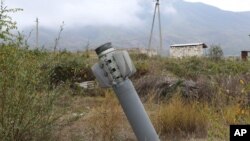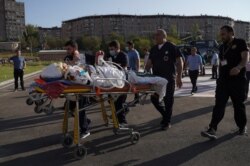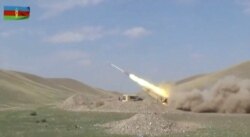The leaders of the United States, France and Russia Thursday called for an immediate cease-fire amid the conflict between ethnic Armenian and Azerbaijani forces over the Nagorno-Karabakh enclave. Intense fighting has killed dozens in the turbulent South Caucasus region over the past few days alone.
“We mourn those lost and express our condolences to the families of the dead and injured,” read a statement from President Donald Trump, French leader Emmanuel Macron and Russia’s Vladimir Putin, first issued on the Kremlin’s official website Thursday.
“We call for an immediate cessation of hostilities between the relevant military forces,” read the statement.
"We also call on the leaders of Armenia and Azerbaijan to commit without delay to resuming substantive negotiations ... in good faith and without preconditions,” said the leaders.
With the diplomatic communique, the U.S., France, and Russia resumed their roles as co-chairs of an Organization for Security and Cooperation in Europe (OSCE) peace effort that dates to the beginnings of the conflict over Nagorno-Karabakh in the early 1990s.
Their joint appeal also comes amid growing concerns that Turkey—a traditional ally of Azerbaijan and NATO member that Armenians blame for a genocide of their people over a century earlier—could trigger a wider regional conflict.
Ahead of the statement, President Macron accused Ankara of “warlike” behavior by supplying mercenaries to the battlefield in Syria.
"Today, we have information, with certainty, that indicates that Syrian militants have left [that] field of combat ... to rejoin this field of combat in Karabakh, Macron said. “It is very serious.”
While the Kremlin readout made no mention of the Turkish role, Russia’s Foreign Ministry warned earlier this week that it believed mercenaries from Syria and Lebanon had joined in the fighting over Nagorno-Karabakh.
Turkey has denied sending fighters but repeatedly voiced its support for Azerbaijan in the conflict.
Russia, in turn, has a strategic defense alliance with Armenia but has sought to maintain good relations with Azerbaijan—a careful balancing act that regional observers say is now in danger of collapse.
“Putin has a hard decision—come to Armenia’s aid and he ends Russia’s role as a peacekeeper in the conflict. But he can’t abandon Armenia either,” Alexei Malashenko of the Institute for Dialogue of Civilizations in Moscow told VOA.
Malashenko notes that Russia—along with the former Soviet states of Belarus, Kazakhstan and Kyrgyzstan—is committed to a common defense pact with Armenia, should the government in Yerevan request military assistance.
The inclusion of Turkey in future negotiations, he added, would be key to keeping the fighting from spiraling out of control.
Fighting between Armenia and Azerbaijan broke out on Sept. 27 — the latest in a long-simmering conflict that erupted following the collapse of the Soviet Union.
Roots of the conflict
Nagorno-Karabakh is an ethnically Armenian enclave inside Azerbaijan’s borders that was the site of a war in the early 1990s that killed 30,000 and displaced more than one million people.
Nagorno-Karabakh has declared its independence but the international community formally recognizes the territory as part of Azerbaijan.
Further contributing to distrust are religious tensions: Armenia is majority Christian while Azerbaijan is primarily Muslim.
A 1994 internationally negotiated cease-fire froze the conflict but failed to bring a lasting peace.
Over the years, both sides have engaged in skirmishes and breached the cease-fire—with dead and casualties to show for it. The latest fighting broke out after Armenia and the authorities in Nagorno-Karabakh said Azerbaijan launched a “wholescale attack” against the enclave.
The government in Baku said it was engaged in a “counterattack” and accused Armenia of infiltrating the enclave with weapons and troops.
Reports of mounting casualties
The renewed diplomatic push comes as Armenia and Azerbaijan trade accusations, saying the other has inflicted heavy damage.
Azerbaijan’s Ministry of Defense said its forces had killed up to 2,300 Armenian soldiers and destroyed 130 Armenian tanks, 200 artillery installations and 25 missile defense systems.
For its part, Armenia said it had killed 790 Azeri soldiers and injured 1,900. The government in Yerevan also claimed it had destroyed 137 Azeri tanks, 72 drones, and seven helicopters.
While none of the figures could be confirmed, human rights groups said civilians were caught up in the fighting.
“The last escalation has caused fear among the population with many people trying to leave and move themselves and their families to safety,” said Eteri Musayelian of the International Committee of the Red Cross when reached by VOA in Nagorno-Karabakh.
“There are civilians among the casualties on both sides,” added Musayelian.
“All sides should remember that attacks targeting civilians are serious violations of international humanitarian law and constitute war crimes,” said Hugh Williamson, director of Europe and Central Asia programs at Human Rights Watch, in a statement.
“This is true even if they are carried out in reprisal for indiscriminate attacks by the adversary,” he added.






